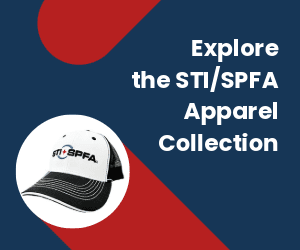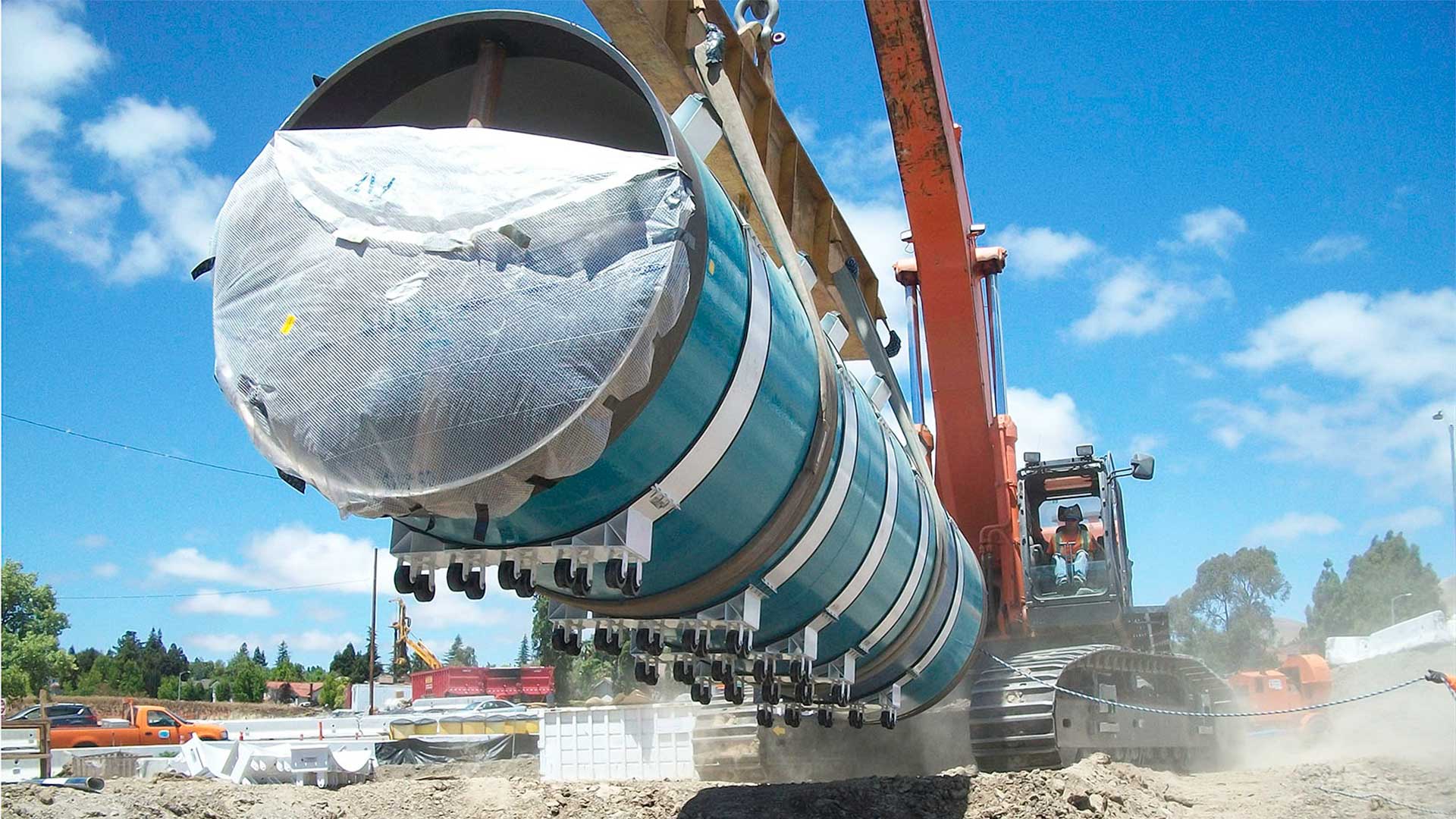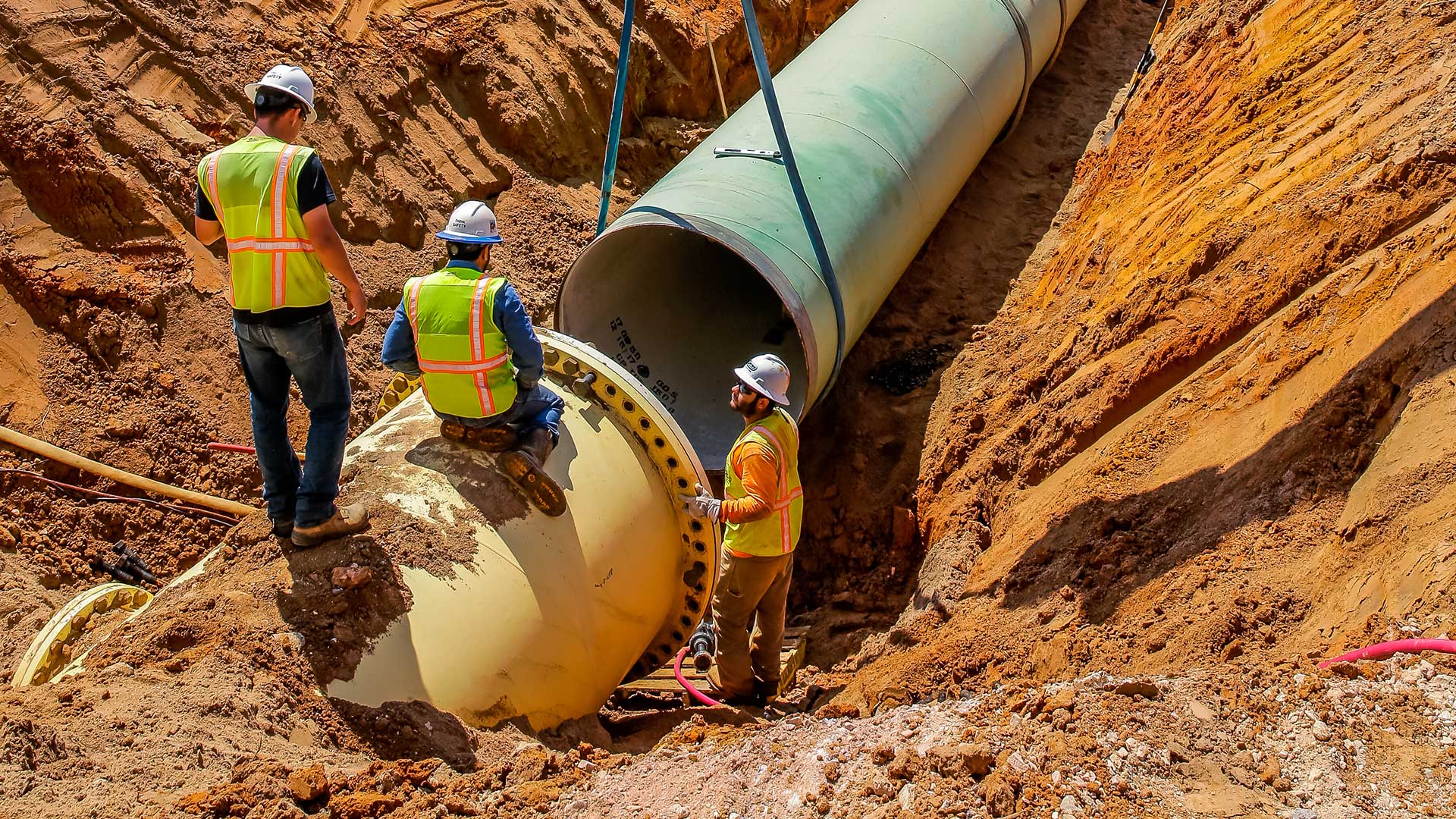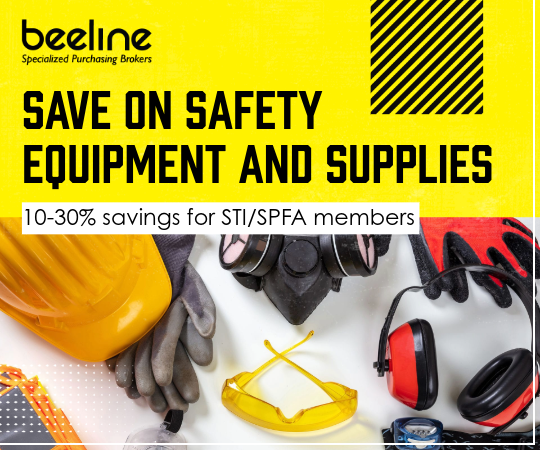Specifying engineers already know the many benefits of fabricated steel pipe in the water transmission industry. The flexibility to design steel pipe to meet the needs of any project, in the most demanding of conditions, has evolved fabricated pipe into a highly focused industry.
Water pipe customers should insist upon a quality product and at least minimum industry standards in their contract documents. Current industry requirements are trending toward quality steel pipe certification from a third party testing organization. These certifying agencies need to be familiar with quality manufacturing requirements.
This discussion will look at the importance of fabricator certification. For example, what traits are desirable in a certifying agency? Why are third party auditor qualifications so important? What attributes/processes should be audited at the fabrication facility? And what kind of follow-up systems are needed to insure compliance?
In addition, the discussion will include applicable industry standards for steel pipe and subsequent quality requirements, as well as related accessories, linings and coatings. Process control, fabrication/welding, testing, inspection and documentation will also be included in the discussion.
The Steel Plate Fabricators Association (SPFA) developed a certification program for steel pipe fabricators almost 20 years ago. The Steel Pipe Section of STI/SPFA is a collection of many of the steel pipe and fitting manufacturers that supply product to the water transmission industry, as well as many of the suppliers to that industry.
Many specifying engineers recognize the SPFA certification program today as an essential part of their project specifications. A brief overview of the SPFA pipe manufacturer certification will complete the discussion.
Why Certification?
Why would you want a certified pipe manufacturer? Certainly there are many manufacturers out there that can fabricate and deliver a quality product without any certifications. So why do they need to be certified? It is a matter of confidence and consistency. Are you sure that your getting the correct materials, do their testing procedures follow specifications, are their pressure gauges and test instruments calibrated? If there is a problem a few years down the road, what assurances do you have that the gauges were calibrated and that the material met specification?
When you contract with a manufacture who has third party certification, you would certainly expect that their gauges are calibrated and materials meet specification.
Third party certification often provides peace of mind that you are dealing with a quality organization that not only meets but also exceeds specifications and industry standards. A manufacturer may have the qualifications and certifications to supply pipe to certain standards but without third party review are you really sure?
Water pipe customers and consulting engineers often specify third party certification in their contract documents because they want a supplier with a proven quality control system. They insist that the supplier they choose for the contract has demonstrated (through a certifying agency) the ability to meet the requirements of the standard. If they did not require third party certification, evaluation between non- certified and certified supplier’s quotations would result in an unbalanced playing field.
Third Party Agencies
When selecting a pipe manufacturer does it really matter who performs their third party certification? If they are certified, why should I be concerned with who certified them? The answer to the first question is yes, you most certainly want to know who the third party agency is and what qualifications they have to justify them as a reputable organization. In response to the second question there are many third party agencies that will gladly provide their services regardless of their knowledge or qualifications. A third party agency is not going to accept any liability for their certification services. I can almost guarantee that the agency’s contract will have specific language to this effect.
So what should one look for in a third party certifying agency? First, I would look for an organization that is familiar with the pipe industry and an organization that has a proven track record and is highly regarded in the service sector. Often third party agencies themselves are certified in accordance with industry standards. Do their assessor’s have the correct training, experience and certification to perform audits?
The SPFA certification program for example, subcontracts professional qualified assessors. Do they have a good audit checklist and is it applicable to the type of industry being certified? Was the checklist created by the manufacturer, with the intent of promoting oneself or was it created by the third part agency, that is not familiar with steel fabricated pipe? These are just a few things you should ask yourself when looking at third party certifying agencies.
Auditors/Assessors
Probably the most critical element in the certification process is the lead auditor/assessor. This individual has the task of assessing the manufacturer as it relates to the audit checklist. This person must determine if the manufacturer is in compliance with the checklist. This involves reviewing operation and quality control manuals, test data, certification records and material test reports just to name a few. This also entails an understanding of the issues relating to that particular industry.
A good assessor understands the checklist and what is necessary to provide objective evidence that the manufacturer is in compliance. The assessor should be able to determine if there is a weakness and if further investigation is necessary. The assessor must be able to determine if the evidence is credible, meaning it is not just something the manufacturer produced that may or may not be reliable documentation. The assessor must determine if an audit finding has been identified, based on the checklist requirements.
A good assessor will have the necessary training and experience to perform audits. When we talk about training, we want the assessor to have experience performing audits under the supervision of a lead assessor. There are a number of reputable firms that perform this type of training and/or certification but there is no replacement for on the job experience. Preferably, the assessor will have some previous employment history in the field of manufacturing that is being assessed. That includes welding, coating and testing knowledge, since we are talking about steel pipe fabrication. You would expect that the assessor has had experience with these types of trades.
Checklist
What attributes/processes should be audited at the fabrication facility? A good evaluation checklist will encompass the entire manufacturing process. It should be broken down to specific areas such as:
- Management
- Engineering & Drafting
- Operations & Procurement
- Coatings & Linings
- Quality Control
The checklist must include questions related to the organizational structure of the manufacturer, including job descriptions and duties. Engineering and drafting requirements to insure that the correct shop drawings and specifications are employed must be included. Operation and procurement must be reviewed to insure they meet specification requirements. Coating and lining procedures must be checked for compliance with application performance requirements. Finally, a review of quality control and assurance relating to inspection test procedures and records, including non-compliance, must be performed.
A detailed audit checklist will insure that all significant attributes/processes are evaluated. Determining what is significant is also key. Expertise in pipe manufacturing is critical in determining the components of the complete process needing to be evaluated and controlled. The SPFA checklist for example, was created, reviewed and updated by a consensus process, including steel pipe manufacturers, third party assessors and SPFA technical staff.
Follow-up
So the manufacturer has been certified by a third party agency, how long is the certification good for? 1 year, 2 years, 5 years? It is always a good idea to have a system in place to maintain accountability of the manufacturer. A lot can change within a company over a period of 2 to 3 years. People retire or move to other positions. Markets change, sometimes for the better (or worse) and standards and specifications are always changing. To simply certify a company and not follow up with them is not accomplishing the goal. Therefore the program must have conditions defined that pursue manufacturers to ensure that they are maintaining the requirements of the original certification.
Industry Standards
Fabricated steel pipe has a large number of standards which manufacturers produce and certify their product. Many owners and engineers rely on the American Water Works Association (AWWA) for their standards on water pipe. These standards have critical features to insure the finished pipe is suitable for its intended use. But what are some of those critical features? Is it the hydrostatic leak testing requirements?
Do welders or welding operators need certification? Or is it the type or grade of steel required for certain applications? In addition, do elbows, tees, reducers or other in line fittings that have specific requirements? Often these items are very critical during field installation.
For instance, AWWA requires welders to be certified, but understanding the certification process can be very confusing to some individuals. The standards often include references to other to standards as an option for welder certification. This is why a Certified Welding Inspector (AWS QC1) is required to be employed by the pipe manufacturer in the AWWA C200 standard (“Steel Water Pipe-6 In. and Larger”).
Often steel pipe applications call for a protective lining and AWWA C205 standard (“Cement-Mortar Protective Lining and Coating for Steel Water Pipe-4 In. and Larger – Shop Applied”) is specified in the contract document. Critical tests identified in the standard require the manufacturer to examine the lining material for conformance.
Pipe manufacturers must have properly calibrated test equipment to conduct these types of tests or have a reliable vendor (laboratory) capable of performing the test for them. Along with the testing, the pipe manufacturer must have well documented testing procedures to insure accurate results.
The AWWA C200 standard permits nondestructive testing of special sections. The use of radiography or ultrasonic test methods requires a very specialized skilled technician. The technician must be certified for the given method and have proper testing procedures to conduct the nondestructive examination.
Process Control
Process control, whether it is in welding, testing, inspection and/or documentation is always a critical feature. Does the manufacturer have qualified welding procedures? Does the manufacture perform non-destructive testing and if so, does he have the proper inspection procedures and personnel capable of detecting unacceptable discontinuities? What about hydrostatic test fixtures, are they adequate? All of these processes need control to insure compliance with the specification.
You cannot inspect quality into the pipe! You either have it ingrained in you process or you don’t. No inspection or testing is going to improve the pipe. When you apply proper process control to the manufacturing process you develop quality.
Often when there is a problem, an adjustment may be made to a piece of equipment, e.g.: a welding machine. So the problem goes away, but just about the time you forget about it, the problem returns. Two choices can be made then, 1) go back and adjusting the welding machine again to temporarily fix the problem or 2) investigate what is actually causing the problem to permanently fix it. Simply put, control of process = better quality!
SPFA Certification program
The Steel Plate Fabricators Association (SPFA) pipe certification program is one of the most recognized third party certification program in the water transmission industry. Applicants go through a rigorous audit with over 100 individual checklist items every three years. After the initial audit, every year in between, our third party assessor returns for a follow-up that includes over 50 individual checks.
The checklist, as mentioned previously, is a consensus document produced by the manufacturers, assessors and SPFA. Who better knows the industry (as it relates to fabrication) than the manufacturers themselves? The checklist identifies all of the most critical AWWA standard requirements. All the necessary testing, inspection instruments, welding, coating & lining, and personnel certification requirements, as prescribed by the standard are included in the SPFA checklist.
The assessors of the third party organization have many years of experience in steel fabricated pipe and the SPFA certification program. Assessors are assigned to the plant by the third party agency, so the manufacturer can not just arbitrarily choose the assessor of their liking. Our third party agency, Lloyd’s Registry Quality Assurance, Inc. has an excellent reputation in the inspection/auditing service industry.
Information regarding the SPFA Pipe Quality Certification Program can be obtained by visiting: SPFA Pipe Quality Certification Program
References
American Water Works Association (AWWA)
6666 West Quincy Avenue
Denver, Colorado 80235
American Welding Society (AWS)
550 NW LeJeune Road
Miami, Florida 33126





